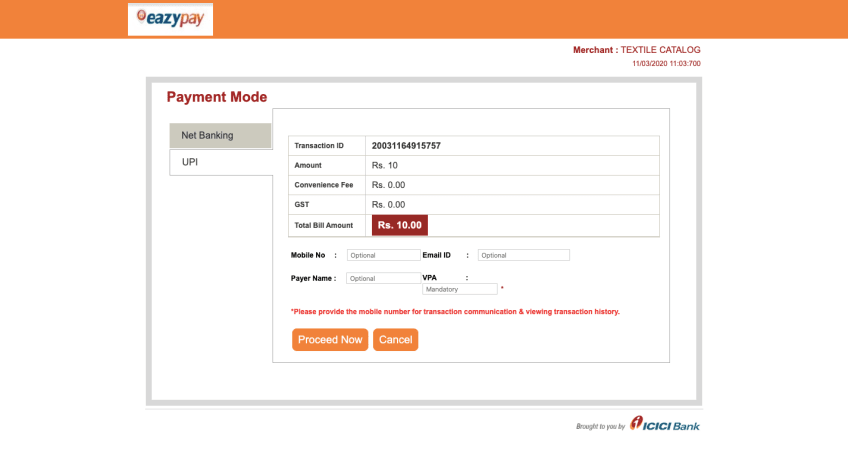Eazypay icici bank payment gateway
Aneh Thakur
. 3 min read
In this tutorial, I will explain to you how we can integrate ICICI bank Eazypay payment gateway into our PHP web application. Eazypay payment gateway is created by ICICI bank which helps you to pay your bills conveniently, be it your education, housing society maintenance or any other bills. You can pay your bills using Cash Deposit, Cheque Deposit, RTGS, NEFT, Net Banking or Cards.
Prerequisites
You need to have EazyPay Account before integration in your web application.
Once you have successfully registered your account on Eazypay you will get your account detail via your registration email address. You need to encrypt your data with a key that they provide you in email and open that link in your browser. Now you need to pass some required parameter in URL to open eazypay payment gateway.
Here is a list of the parameter which is required when we request for payment.
Parameter | Description | Mandatory |
|---|---|---|
Default URL | Yes | |
Merchant ID | 100011 | Yes |
Merchant Reference No | Yes | |
Reference No | 8001 | Yes |
Sub Merchant Id | 1234 | Yes |
Transaction Amount | 80 | Yes |
Encryption key | Yes | |
Paymode | 9 | Yes |
Return URL | Yes | |
Optional Field | No |
Before encryption:-
https://eazypay.icicibank.com/EazyPG?merchantid=100011&mandatory fields=8001|1234|80| 9000000001&optional fields=20|20|20|20&returnurl= http://abc.com/cbc/action.aspx&Reference No=8001&submerchantid=1234&transaction amount=80&paymode=9
After encryption:-
https://eazypay.icicibank.com/EazyPG?merchantid=100011&mandatory fields=u65A+ywICIypfrJVQp9ED2VlkBzkIimiHhLXPyo2P14=&optional fields=faJ6BJUlOqjoV/AEbw5X4g==&returnurl=6WvzNalyXvqOX+aY9ee5oKm8FT+YUF5sz940o6QZvx0=&Reference No=X7VX+1ZnKq+o6K2QWCTERQ==&submerchantid=QVZkBomDLSbitS4C9lGaUA==&transaction amount=aTRTaIdS0sLyzGCxL3Y5dQ==&paymode=nFRjDWSCg0m80aUYivDlqw==
You can use below function to encrypt your data and set that encrypted data in your URL.
You use the below code to generate a link.
Or if you like OOPS you can use this class.
Eazypay ICICI
And after adding this class you can call this
Once you have URL now you can perform click action on your URL and redirect it to Eazypay ICICI website using the below code.

Hope you like this post please don’t forget to subscribe my youtube channel link on top of the page.
More Stories from
India’s Rise in the AI Era: Shaping the Future as a Global Leader
India is becoming a global AI leader through initiatives like IndiaAI, indigenous LLMs like Sarvam AI and BharatGPT, and rapid startup growth. Learn how AI is shaping India’s digital and inclusive future.
AI and Beginner Developers: A Double-Edged Sword in Programming
AI tools are transforming how beginner developers learn to code. Discover the benefits, risks of over-reliance, and best practices to use AI effectively in your programming journey.
Mastering Google AI Mode: A Guide for SEO Professionals in the Age of Answer Engines
Learn how Google AI Mode is changing search. Discover how to adapt your SEO strategy with Answer Engine Optimization (AEO) for AI-powered results.
🚀 OpenAI’s $3 Billion Windsurf Acquisition: What It Really Means
OpenAI's $3 billion Windsurf deal shows that developer tools—not chatbots—are the real future of AI. Here’s what this means for coders, jobs, and the evolving dev landscape.
🚀 How to Build an MCP Server for Zerodha – AI-Powered Trading with Claude
Learn how to build an MCP (Model Context Protocol) server that connects Claude AI with Zerodha’s trading API. Execute stock trades, view portfolios, and automate strategies using natural language.




